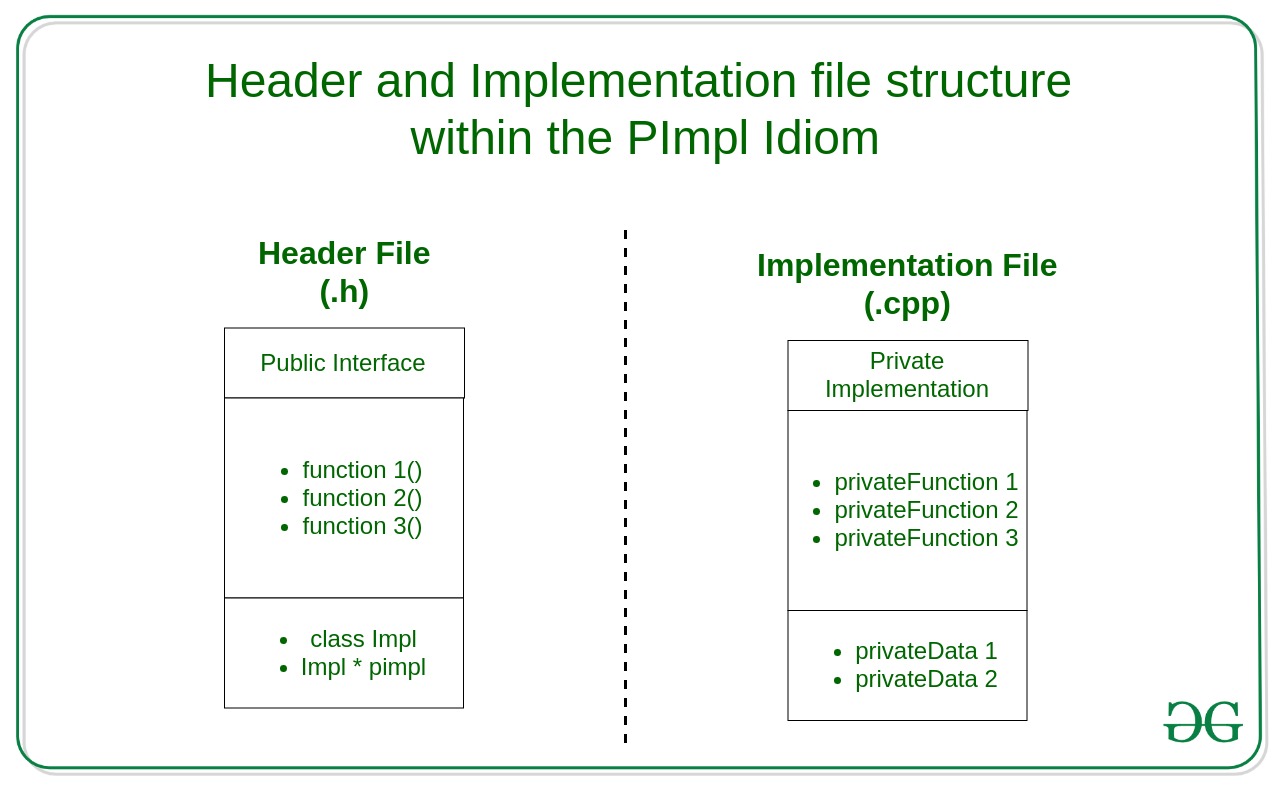PImpl Idiom in C++ with Examples
Last Updated :
27 Dec, 2021
When changes are made to a header file, all sources including it needs to be recompiled. In large projects and libraries, it can cause build time issues due to the fact that even when a small change to the implementation is made everyone has to wait some time until they compile their code. One way to solve this problem is by using the PImpl Idiom, which hides the implementation in the headers and includes an interface file that compiles instantly.
The PImpl Idiom (Pointer to IMPLementation) is a technique used for separating implementation from the interface. It minimizes header exposure and helps programmers to reduce build dependencies by moving the private data members in a separate class and accessing them through an opaque pointer.

How to implement:
- Create a separate class ( or struct ) for implementation
- Put all private members from the header to that class.
- Define an Implementation class ( Impl ) in the header file.
- In the header file create a forward declaration (a pointer), pointing at the implementation class.
- Define a destructor and a copy/assignment operators.
The reason to declare explicitly a destructor is that when compiling, the smart pointer ( std::unique_ptr ) checks if in the definition of the type exists a visible destructor and throws a compilation error if it’s only forward declared.
Using a smart pointer is a better approach since the pointer takes control over the life cycle of the PImpl.
Example:
- The class definition in the header file included is the public interface of the class.
- We define a unique pointer instead of a raw one because the object of the interface type is responsible for the lifetime of the object.
- Since std::unique_ptr is a complete type it requires a user-declared destructor and copy/assignment operators in order for the implementation class to be complete.
- The pimpl approach is transparent from the user’s viewpoint. Changes made to the IMPLementation structure, internally, affect only the file containing it (User.cpp). This means that the user does not need to recompile in order for these changes to get applied.
Header file
#pragma once
#include <memory> // PImpl
#include <string>
using namespace std;
class User {
public:
~User();
User(string name);
User(const User& other);
User& operator=(User rhs);
int getSalary();
void setSalary(int);
private:
class Impl;
unique_ptr<Impl> pimpl;
};
|
Implementation file
#include "User.h"
#include <iostream>
using namespace std;
struct User::Impl {
Impl(string name)
: name(move(name)){};
~Impl();
void welcomeMessage()
{
cout << "Welcome, "
<< name << endl;
}
string name;
int salary = -1;
};
User::User(string name)
: pimpl(new Impl(move(name)))
{
pimpl->welcomeMessage();
}
User::~User() = default;
User::User(const User& other)
: pimpl(new Impl(*other.pimpl))
{
}
User& User::operator=(User rhs)
{
swap(pimpl, rhs.pimpl);
return *this;
}
int User::getSalary()
{
return pimpl->salary;
}
void User::setSalary(int salary)
{
pimpl->salary = salary;
cout << "Salary set to "
<< salary << endl;
}
|
Advantages of PImpl:
- Binary Compatibility: The binary interface is independent of the private fields. Making changes to the implementation would not break the dependent code.
- Compilation time: Compilation time drops due to the fact that only the implementation file needs to be rebuilt instead of every client recompiling his file.
- Data Hiding: Can easily hide certain internal details such as implementation techniques and other libraries used to implement the public interface.
Disadvantages of PImpl:
- Memory Management: Possible increase in memory usage due to more memory allocation than with the default structure which can be critical in embedded software development.
- Maintenance Effort: The maintenance is becoming more complex due to the additional class in order to use pimpl and additional pointer indirection (Interface can be used only via pointer/reference).
- Inheritance: Hidden implementation cannot be inherited, although a class PImpl can.
Reference: https://en.cppreference.com/w/cpp/language/pimpl
Share your thoughts in the comments
Please Login to comment...